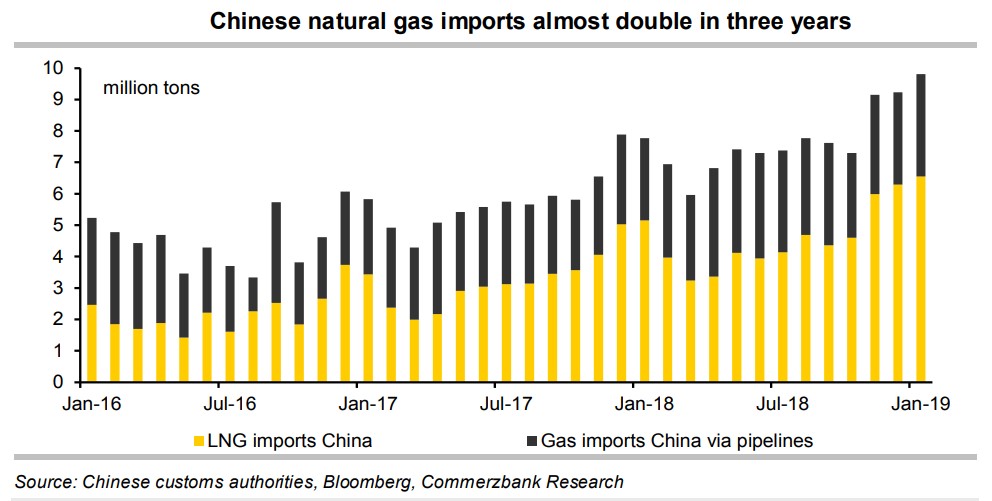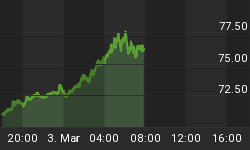Monday, February 18, 2019
Choppy trading ahead of busy week. Global stocks were shaky on Monday as U.S.-China trade talks head into a crucial week. Negotiations continue in Washington with less than two weeks until the deadline, which would see tariffs jump without a deal. However, talks have progressed and the tone, especially from the White House, has turned positive. Meanwhile, the minutes of last month’s meetings from both the U.S. Federal Reserve and the ECB will be released this week, which could offer further guidance into the thinking of central bankers. U.S. stock markets were closed on Monday for the federal holiday.
Chart of the Week

(Click to enlarge)
- China’s appetite for natural gas imports is “insatiable,” according to Commerzbank.
- China’s natural gas imports surged by 26 percent in January compared to a year earlier. Last year, imports jumped by 40 percent.
- However, inventories are now relatively high, which could mean that imports could slow in the coming months.
Markets
U.S. Congress considers curtailing Trump’s trade power. Momentum is growing in the U.S. Congress to curtail presidential trade authority. Feeling burned by Trump’s trade wars, the legislation would claw back power from the executive branch, putting more authority in the hands of the Congress. Notably, the push for curtailing executive branch authority over trade comes from two Republican senators – Rob Portman (R-OH) and Pat Toomey (R-PA) – and has some support from the powerful Sen. Finance Chairman Chuck Grassley (R-IA).
Spain calls snap election. Spain’s Socialist Prime Minister Pedro Sanchez called a snap election for April. The push for Catalan independence, as well as the rise of nationalism and a far-right party, has raised concerns about political and economic turmoil returning to Spain. That will add to the political malaise in Europe, bedeviled by growing euro skeptics and a yet-to-be-determined UK exit from the European Union. Related: Silver Demand Set To Grow Significantly In 2019
Trump receives report on autos. A Commerce Department investigation into whether or not car manufacturing is a national security concern has finally been completed and sent to President Trump, a development that could be used for tariffs on car imports. Potential car tariffs come as the global auto market has slowed down. China reported a 17.7 percent decline in auto sales in January from a year earlier, adding to a string of monthly sales declines.
Commodities
Investors burned on EV metals. The spike in prices for a variety of metals used in electric cars – lithium, cobalt, nickel, among others – over the last few years ran into a wall in 2018. Prices for these all-important metals declined in 2018 and continue to slide this year. Cobalt prices are down more than 30 percent so far in 2019, dropping to a two-year low. Lithium is at a multi-year low and has declined for ten consecutive months. Higher production came after the spike in prices from a few years ago, while slowing growth in China has also contributed to the declines.
China commodity imports remain strong. The Chinese economy has begun to slow down but imports of several key commodities remained robust in January. Crude oil, natural gas, copper and coal imports expanded by 5 percent, 26, percent, 15 percent and 20 percent year-on-year, respectively, according to Barclays. “[T]he strong January imports should ease some concerns about a sharp downturn in China’s commodity imports in the wake of the recent weakness in macroeconomic indicators,” Barclays said in a note.
Gold nears nine-month high. Gold prices jumped to $1,325 per troy ounce, nearing a nine-month high. “Even benign stock markets and renewed ETF outflows are not impeding its rise given that the political and economic uncertainty remains,” Commerzbank wrote in a note. The bank cited the National Emergency declaration by President Trump as well as the split between the U.S. and its European allies over Iran at the Munich Security Conference. Meanwhile, the deadline over Brexit continues to draw near.
Energy
U.S. shale industry to slow. Pressure from Wall Street and lower oil prices could contribute to a slowdown in the shale patch. Pioneer Natural Resources (NYSE: PXD) announced a cut in 2019 spending plans last week, trimming its budget by $350 million, or 11 percent. That adds to a growing list of other spending cuts from the shale industry. “There aren’t nearly as many drilling dollars available,” Bobby Whiteside, president of Midland, Texas-based oil producer Regions Permian LLC, told Reuters. “If Wall Street wants you to drill within cash flow, you’re going to have slower growth.”
BP: Renewable energy and natural gas to dominate. The bulk of energy supply growth going forward is going to come from renewable energy and natural gas. According to BP’s (NYSE: BP) long-term energy outlook, renewable energy and natural gas will account for 85 percent of supply growth through 2040. Renewable energy supply will grow at an annual rate of 7.1 percent over that timeframe. This “brings into sharp focus just how fast the world’s energy systems are changing, and how the dual challenge of more energy with fewer emissions is framing the future,” said BP Chief Executive Bob Dudley.
Related: Billion Dollar Bust Proves The World Still Has A Drug Problem
Oil prices jumped on trade optimism. President Trump said that the U.S.-China trade talks were “very productive,” helping to provide a lift to oil prices. Meanwhile, an outage at the Safaniyah oil field in Saudi Arabia resulted in an unexpected production cut. “Markets are astonished by the amount of production cuts and the further reductions Saudi plans to make,” Howie Lee, a Singapore-based economist at Oversea-Chinese Banking Corp., said in a Bloomberg interview. “Even though there was no conclusive trade deal from Beijing, the already bullish oil market took no news as good news.”
Cryptocurrencies
JP Morgan to create cryptocurrency. In the next few months, JP Morgan Chase is set to launch trials for its own cryptocurrency, dubbed the “JPM Coin.” The digital coin will instantly settle payments between clients. The investment bank envisions a future in which the financial system transitions over onto the blockchain. “So anything that currently exists in the world, as that moves onto the blockchain, this would be the payment leg for that transaction,” said Umar Farooq, head of J.P. Morgan's blockchain projects, according to CNBC. “The applications are frankly quite endless; anything where you have a distributed ledger which involves corporations or institutions can use this.”
Bitcoin to turn positive? Bitcoin and other cryptocurrencies are on track to post their first month of price gains since July 2018. Why? First, the crypto market may have been oversold. Also, the fundamentals are set to improve. Ethereum prices have also stabilized. Bitcoin is also finding more acceptance as a method of payment.
Japanese bank pushes forward on cryptocurrency. The Mizuho Financial group, which runs Japan’s second-largest bank (Mizuho Bank), has developed a smartphone app that allows customers to pay for transactions at a wide array of Japanese retail stores with J Coin, a forthcoming cryptocurrency to be launched by the bank. “It looks like Mizuho is aiming to win the race to become the first Japanese megabank to get its stablecoin into circulation. By all accounts, the bank wants to ensure its tokens are accepted at all the major shopping hotspots popular with Chinese tourists,” Hiroyuki Yamamoto, a Tokyo-based banking consultant, told Cryptonews.com
By Josh Owens for Safehaven.com

















